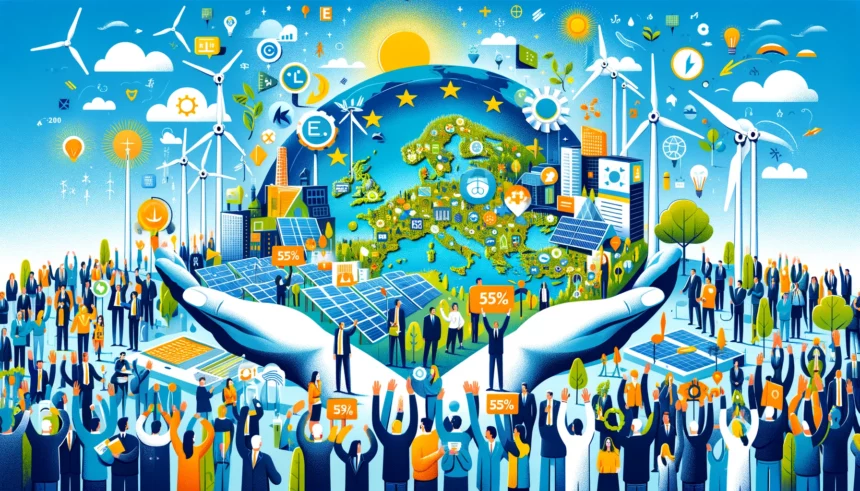Listen to the article now:
Europe is on a bold journey to become the world’s first climate-neutral continent, a vision enshrined in the EU Climate Law. This ambitious goal, set forth by the European Green Deal, outlines a comprehensive roadmap for a transformational shift across the continent. Such a shift promises not only to mitigate the adverse effects of climate change but also to usher in a new era of economic growth and social well-being.
All 27 EU Member States have embraced this vision, committing to a significant reduction in emissions—by at least 55% by 2030 compared to 1990 levels—as a critical milestone on the path to climate neutrality by 2050. This commitment is not just aspirational but is now reinforced by legally binding climate targets that span the entire spectrum of the European economy.
The EU’s strategy encompasses a holistic package aimed at achieving these targets. It includes stringent emissions reduction goals across various sectors, an ambition to augment natural carbon sinks, and an overhauled emissions trading system designed to cap emissions effectively. This system not only puts a price on carbon, thus discouraging pollution, but also channels investments towards a green transition, demonstrating a model for balancing environmental and economic considerations.
A key innovation in the EU’s approach is the earmarking of 100% of emissions trading revenues for climate and energy-related projects. This approach underscores the commitment to ensuring that the green transition benefits all sectors of society. The Social Climate Fund, endowed with €65 billion from the EU budget and additional funds bringing the total to over €86 billion, exemplifies this commitment. It is designed to cushion the most vulnerable citizens and small businesses against the impacts of the transition, ensuring that no one is left behind.
In a bold move towards sustainable mobility, the EU has mandated that by 2035, all new cars and vans registered in Europe must be zero-emission. This mandate is supported by intermediate targets for 2030, requiring a 55% reduction in average emissions for new cars and a 50% reduction for new vans, setting a clear trajectory towards zero-emission road transport by 2050.
The Green Deal Industrial Plan is the cornerstone of Europe’s strategy to maintain its competitive edge in the era of industrial innovation and clean technology. The plan rests on four pillars: creating a predictable regulatory environment, facilitating faster access to funding, enhancing skills, and promoting open trade for resilient supply chains.
A pivotal element of this plan, the Net-Zero Industry Act, introduced in March 2023, aims to escalate the production of clean technologies within the EU. This act is set to generate green jobs and prepare the Union for the clean-energy transition by improving conditions for establishing net-zero projects and attracting investments.
In essence, Europe’s journey towards climate neutrality by 2050 is not just an environmental imperative but a comprehensive economic and social agenda. It exemplifies a proactive approach to the dual challenges of climate change and sustainable development, marking Europe as a trailblazer in the global effort to forge a sustainable future.
















